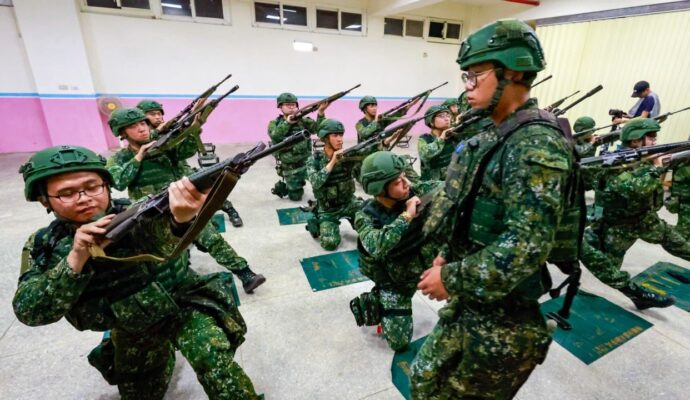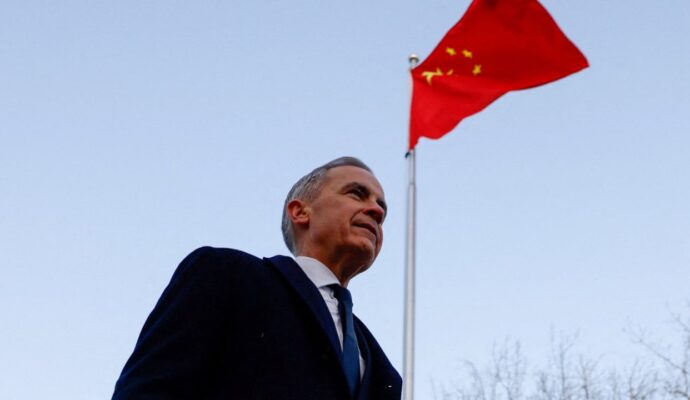The Chinese embassy in Washington did not immediately respond to a request for comment.
Chinese Commerce Minister Wang Wentao has expressed Beijing’s willingness to work with Seoul to deepen bilateral trade and investment cooperation. Photo: DFAT via AP
The pointed remarks came a day after Chinese Commerce Minister Wang Wentao met his South Korean counterpart on the sidelines of the Asia-Pacific Economic Cooperation (Apec) trade ministers’ meeting held May 25-26 in Detroit.
“The two sides focused on exchanging views on maintaining the stability of the industrial and supply chains and strengthening bilateral, regional and multilateral cooperation,” according to a Chinese commerce ministry readout. It stated that “China’s promotion of high-level opening up will provide new opportunities for countries around the world, including South Korea”.
Wang expressed Beijing’s willingness to work with Seoul to deepen bilateral trade and investment cooperation as well as maintain stable industrial and supply chains. About 40 per cent of South Korea’s chip exports go to China, according to trade ministry data.
Raimondo’s comments on Saturday came in Detroit on the first anniversary of a US-led economic initiative aimed at countering China’s influence in the Indo-Pacific.
After multiple rounds of intense negotiations spanning almost a year, the 14-nation IPEF on Saturday reached its first-ever agreement on building sustainable and resilient supply chains focused on strategic items including critical minerals and semiconductors.
“I’m very excited to announce this afternoon that we have substantially concluded negotiations on the IPEF supply chain agreement,” said Raimondo at a media briefing after the four-hour discussions concluded. The closed-door, ministerial-level meetings covered trade, supply chains, green economy and anti-corruption.
US President Joe Biden launched the framework in May last year, describing it then as “writing the new rules for the 21st century economy” by cooperating with countries that share “common values” such as democracy.
Its participating countries include Australia, Brunei, Fiji, India, Indonesia, Japan, Malaysia, New Zealand, the Philippines, Singapore, South Korea, Thailand and Vietnam. Combined they account for 40 per cent of global gross domestic production.
Raimondo described Saturday’s development as a “really very big deal”.
[embedded content]
“By deepening our cooperation through the IPEF, this proposed supply-chain agreement will improve the business environment for US businesses, drive investment in American companies and workers, strengthen and bolster American jobs, and help the US to stay competitive globally”.
The agreement will establish an IPEF supply-chain council charged with coordinating sector-specific actions to build resilience and competitiveness into the supply chains of crucial sectors.
It will also set up what Raimondo called an “ironclad” IPEF supply-chain response network to give IPEF partners an emergency communications channel.
The agreement further calls for a labour rights advisory board to provide new mechanisms to address workforce training, upskilling, and labour rights concerns.
“We all learned the hard way during Covid how difficult it is if you aren’t able to communicate swiftly and transparency during a crisis of supply chains,” Raimondo said.
Yet differences on trade remain.
On Friday, Wang raised concerns about IPEF with US Trade Representative Katherine Tai during a one-on-one conversation on the margins of the Apec meeting.
China, the world’s second-largest economy, regards IPEF as an American attempt to contain its rival’s economic expansion.
In 2016, Biden’s predecessor, Donald Trump, withdrew the US from the 12-member Trans-Pacific Partnership, the CPTPP’s predecessor, to protect domestic manufacturing and its workers. The initial deal was signed during the Obama administration to counter China’s rise.
Biden, who took office in 2021, has ruled out rejoining the group. However, China has applied for membership. Beijing is also a member of the RCEP, whose ranks include Japan and South Korea.
And while IPEF attendees in Detroit reached a consensus on supply chains, developing economies have continued to seek greater access to both US markets and lower tariffs.
India, a key US ally in the Indo-Pacific, did not take part in the IPEF trade negotiations on Saturday. The government of Narendra Modi has faced pressure at home from some in civil society and other groups to withdraw from the trade talks.
Tai, the American trade envoy who led IPEF negotiations on trade, described the framework as “not a traditional trade deal”, saying its goals from the start were “going to be different for this”.
“We’re not just trying to maximise efficiencies and liberalisation,” Tai said. “We’re trying to promote sustainability, resilience and inclusiveness.”
“I know that change is scary. The change is happening all around us anyway.”

